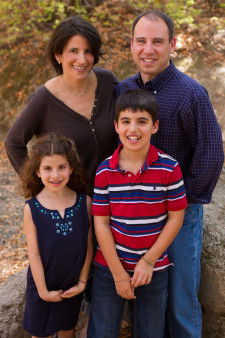The Surprising Sign That My Cancer Diagnosis Doesn’t Define Me Anymore
 Every few weeks, Facebook shows me a “FB memory” of something I posted previously. Whenever this happens, I immediately classify the memory as either “BCD” (before cancer diagnosis), or “ACD.” Today, for the very first time, a memory popped up, and I struggled to figure out whether it was BCD or ACD.
Every few weeks, Facebook shows me a “FB memory” of something I posted previously. Whenever this happens, I immediately classify the memory as either “BCD” (before cancer diagnosis), or “ACD.” Today, for the very first time, a memory popped up, and I struggled to figure out whether it was BCD or ACD.
This may seem like a small thing, but it was a momentous milestone for me. When I was diagnosed with Stage IV lung cancer 6.5 years ago, the life shift was so colossal, absolutely nothing was the same. My parenting changed, my marriage changed, my friendships, my job, my diet, my hair, my body, my sleep cycle, everything down to my resting heart rate changed. That’s why when I’d see photos of myself pre-diagnosis, it was hard to recognize that person as … me. It felt very much like the pre-diagnosis Lisa was a different person altogether, one I couldn’t reach anymore.
For a long time, seeing these memories came with a strong hit of wistful sadness, a glimpse into my blissfully naive self before the trainwreck of a diagnosis would decimate life as I knew it. “Oh, look at that Lisa who had no idea about the shitstorm awaiting her; how easy she had it.” I grieved and wished I could go back.
Over the years, though, my goal has shifted away from reaching back to re-become the pre-diagnosis Lisa. More than our DNA, we are all fundamentally made up of the collection of our experiences. I’m not glad I got cancer, but it’s shaped me, become part of my story. I no longer wish to erase part of my path, wash away the memories, undo the learning. I wouldn’t recognize myself.
I recently read the book Know My Name, by Chanel Miller, the woman who was assaulted by Stanford student Brock Turner (you know, light reading to distract me from the pandemic). I found Chanel’s book insightful and relatable, not only because, like her, I am a sexual assault survivor, but also because I found her process applicable to my experience with cancer. Chanel writes about how healing doesn’t happen by trying to advance past a trauma. Counterintuitively, healing happens by delving into the trauma, facing it, examining it thoroughly (ideally with the help of a good therapist and/or other support systems – writing a book or a blog seems to work decently, too) until its power defuses somewhat, and it becomes one of many parts of your story, rather than the single defining moment, leaving everything else to fall “before” or “after.” If a person can find their way to this point then, as Chanel writes, instead of having the past trauma define the rest of their life, they can begin to belong more to their present.
This is the significance of no longer seeing a bright line clearly dividing my BCD and ACD selves. Gradually, after 6+ years, of delving into difficult feelings, I feel more integrated. I have not reverted to my BCD self, nor have I advanced past my diagnosis, leaving it behind (not really an option for patients in ongoing treatment anyhow).
Instead, I have gradually reabsorbed my previous BCD self, reincorporated it. Like Chanel and so many other survivors, I have evolved “inside the suffering,” weaving back together my BCD and ACD selves into a new self I mostly like, even if the suffering part sucks. My cancer diagnosis and other traumas are neither beginnings or endings, but simply inextricable from the greater story that makes up the whole of me, today.


